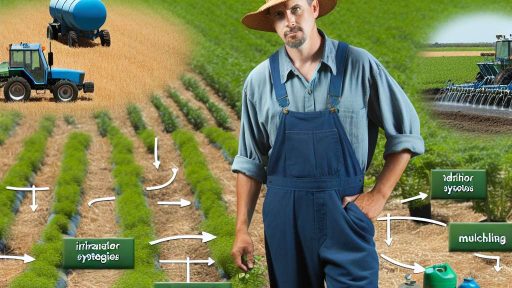Overview of Climate Change and Its Impact on Agriculture
Climate Change: A Growing Concern
Climate change poses significant challenges to global agriculture.
Rising temperatures affect crop yields and livestock health.
Furthermore, unpredictable weather patterns disrupt planting and harvesting.
Farmers must adapt to these changes to sustain production.
Impact on Crop Production
Crop productivity fluctuates due to changing climate conditions.
For instance, increased temperatures can lead to reduced yields.
Heat stress directly affects the photosynthesis processes in plants.
Additionally, extreme weather events can cause devastating losses.
These changes may force farmers to alter their planting schedules.
Effects on Soil Health
Climate change has significant implications for soil health.
Higher temperatures and varying precipitation levels change soil composition.
This degradation can lead to reduced fertility and nutrient availability.
Moreover, erosion risks increase with heavier rainfall and wind events.
Impacts on Livestock
Livestock farmers face various challenges due to climate change.
Heat stress can lead to decreased milk production and fertility issues.
Transform Your Agribusiness
Unlock your farm's potential with expert advice tailored to your needs. Get actionable steps that drive real results.
Get StartedAdditionally, changing weather patterns can spread diseases.
Livestock feed availability may also diminish in certain regions.
Financial Implications for Farmers
The financial landscape for farmers changes with climate impacts.
Increased input costs may arise from the need for adaptive practices.
Insurance premiums could rise due to higher risk factors.
Consequently, many farmers face financial instability and uncertainty.
Adaptation Strategies
Farmers must implement adaptation strategies to mitigate climate risks.
Crop diversification can enhance resilience against weather extremes.
Additionally, adopting sustainable farming practices proves beneficial.
Precision agriculture offers data-driven insights for better decision-making.
Investing in irrigation improvements can optimize water usage.
The Role of Policy and Regulation
Government policies significantly influence agricultural resilience.
Regulations promoting sustainable farming practices can be beneficial.
Support for research and development can drive innovation in agriculture.
Moreover, financial incentives may encourage climate-smart practices.
Key Climate Change Regulations Affecting Agricultural Real Estate
Introduction to Climate Regulations
Climate change regulations are becoming more significant for agricultural real estate buyers.
These regulations influence land use and farming practices across the country.
Buyers must understand these regulations to make informed decisions.
Federal Regulations
The federal government has established various regulations targeting climate change.
For example, the Environmental Protection Agency (EPA) enforces regulations on greenhouse gas emissions.
These regulations aim to lower carbon emissions from agricultural operations.
Compliance with these rules can affect land value and operational costs.
Clean Water Act Compliance
The Clean Water Act requires agricultural operations to manage water resources responsibly.
This includes obtaining permits for discharges and implementing best management practices.
Showcase Your Farming Business
Publish your professional farming services profile on our blog for a one-time fee of $200 and reach a dedicated audience of farmers and agribusiness owners.
Publish Your ProfileNon-compliance can lead to hefty fines and loss of land suitability.
Endangered Species Act Considerations
The Endangered Species Act impacts agricultural development on certain lands.
Landowners need to assess how their activities affect designated habitats.
Protecting these species can require land use modifications.
State-Level Regulations
State governments are also enacting climate change regulations that affect agriculture.
These regulations vary widely by state and often address unique local issues.
For instance, some states have mandates for reducing water usage in farming.
Water Conservation Measures
Water-intensive agricultural practices face increasing regulation in drought-prone areas.
Farmers may need to adopt alternative irrigation techniques or crop selections.
These changes are essential for long-term sustainability and compliance.
Land Use Policies
Many states are revising land use policies to include climate resilience requirements.
These policies can restrict development in high-risk areas such as floodplains.
Understanding these policies helps in assessing land value and viability.
Local Ordinances and Zoning Laws
Local governments can implement their own climate-related regulations.
These often focus on zoning laws that promote sustainable farming practices.
Buyers should research local ordinances that could impact their planned use of the land.
Urban Growth Boundaries
Some regions have established urban growth boundaries to protect agricultural land.
These boundaries limit the expansion of urban developments into farming areas.
Such regulations can enhance the long-term value of agricultural properties.
Environmental Impact Assessments
Local regulations may require environmental impact assessments for new agricultural projects.
These assessments evaluate potential effects on local ecosystems.
Compliance can add time and costs to land development projects.
Incentives and Support Programs
In addition to regulations, various incentives promote environmentally friendly farming.
The federal and state governments offer financial assistance for sustainable practices.
These incentives can significantly benefit real estate buyers focusing on sustainability.
Tax Credits for Sustainable Farming
Farmers may qualify for tax credits for implementing renewable energy solutions.
These solutions can include solar panels and efficient irrigation systems.
Grants for Best Management Practices
Grants are available for adopting best management practices that reduce environmental impacts.
Utilizing these grants can offset initial investment costs for real estate buyers.
Navigating Regulations in Agricultural Real Estate
Navigating these climate change regulations is crucial for agricultural real estate buyers.
Understanding federal, state, and local regulations helps mitigate risks effectively.
Staying informed can lead to better investment decisions and sustainable operations.
How Climate Policies Influence Land Use and Property Value
Impact of Regulatory Changes
Climate policies significantly reshape agricultural land use.
Regulations often dictate what crops farmers can grow.
These changes directly affect the viability of certain lands.
Consequently, property values fluctuate based on regulatory landscapes.
Such shifts can create uncertainty for potential buyers.
Financial Implications for Buyers
Increased regulations can lead to higher operating costs.
Investors must account for these added expenses when evaluating properties.
A detailed financial analysis becomes crucial for sound investments.
Showcase Your Farming Business
Publish your professional farming services profile on our blog for a one-time fee of $200 and reach a dedicated audience of farmers and agribusiness owners.
Publish Your ProfileMoreover, potential buyers must anticipate future regulatory changes.
Market Trends and Property Values
As regulations evolve, market trends show distinct patterns.
For instance, properties compliant with eco-friendly standards gain value.
Buyers increasingly favor sustainable practices in agriculture.
This trend encourages property owners to invest in green technologies.
Ultimately, these factors influence property demand and pricing.
Environmental Considerations
Climate policies focus on promoting sustainable farming practices.
These practices help protect natural resources and biodiversity.
Land buyers are now more aware of environmental impacts.
Adopting climate-resilient strategies becomes a priority for agriculture.
Long-term sustainability enhances land appeal and value.
Future Outlook for Agricultural Real Estate
Looking ahead, climate regulations will continue to evolve.
Investors must stay informed about policy changes and trends.
Adapting quickly will help mitigate potential risks.
Informed decisions will lead to successful agricultural investments.
Ultimately, understanding these dynamics is vital for buyers.
Find Out More: Water-Saving Irrigation Techniques for Sustainable Agricultural Growth
Case Studies: Successful Adaptation to Climate Regulations in Agriculture
Innovative Water Management Techniques
One successful case involves Green Fields Farm in California.
They implemented advanced irrigation systems to conserve water.
These systems use sensors to monitor soil moisture.
As a result, they decreased water usage by 30%.
Furthermore, they improved crop yields during drought conditions.
This adaptation saved costs and enhanced sustainability.
Transition to Organic Farming
Another example is Sunny Acres in Oregon.
This farm transitioned to organic practices to reduce chemical use.
They found that organic methods increased soil health and biodiversity.
Subsequently, this attracted a premium price for their products.
Moreover, their adherence to regulations boosted their market reputation.
Investing in Renewable Energy
Bright Future Farms in Texas adopted solar energy systems.
This investment significantly reduced their reliance on fossil fuels.
In addition, it provided long-term savings on energy costs.
They also received incentives for using renewable resources.
Consequently, this move aligned with state climate regulations.
Collaboration for Sustainable Practices
Farmers in the Midwest formed a cooperative to share resources.
This coalition focuses on sustainable farming practices.
They exchange knowledge on soil health and pest management.
Additionally, they implement joint marketing strategies for eco-friendly products.
This collaborative approach strengthens their position in the market.
Delve into the Subject: Biodiversity Benefits of Integrating Agroforestry in Rural Properties
Financing Agricultural Properties in the Context of Climate Change Regulations
Understanding Climate Change Regulations
Climate change regulations are increasingly shaping agricultural finance.
Showcase Your Farming Business
Publish your professional farming services profile on our blog for a one-time fee of $200 and reach a dedicated audience of farmers and agribusiness owners.
Publish Your ProfileThese laws aim to reduce greenhouse gas emissions across industries.
Agricultural practices are not exempt from scrutiny under these regulations.
Investors must understand how these laws affect property values.
Regulations can influence local agricultural practices significantly.
Impact on Financing Options
Climate change regulations can limit traditional financing options for buyers.
Lenders are adjusting their criteria based on environmental risks.
This shift affects the types of loans available for agricultural properties.
Therefore, potential buyers need to explore alternative financing sources.
Government-backed loans may prioritize environmentally friendly practices.
Desirable Property Features
Properties with sustainable features are becoming more appealing to buyers.
Water conservation systems add significant value to agricultural land.
Renewable energy installations are increasingly seen as a desirable attribute.
Soil health and biodiversity practices can enhance property appeal.
Ultimately, these factors may result in better financing terms.
Risk Assessment and Management
Investors should implement comprehensive risk assessments before purchasing.
Climate risks can affect crop yields and property viability.
Purchasers need to evaluate properties based on climate resilience strategies.
Engaging experts can provide insights into effective risk management.
This approach ensures a sustainable investment in agricultural real estate.
Future Trends in Agricultural Financing
As climate regulations evolve, financing trends will also adapt.
Investors should prepare for a landscape that increasingly values sustainability.
Technological advancements may streamline assessments and financing processes.
Lenders will likely seek partnerships with environmentally conscious firms.
Embracing these changes can lead to better financing opportunities.
You Might Also Like: How Changing Rainfall Patterns Influence Agricultural Land Prices

Regional Variations: How Different Areas are Affected by Climate Policies
Impact on Coastal Regions
Coastal regions face unique challenges due to rising sea levels.
In these areas, agricultural land may become inundated by saltwater.
This increases the risk of crop failure and land loss.
Moreover, stricter regulations may limit development in vulnerable areas.
Farmers must adapt to changing soil conditions caused by salinity.
Effect on Inland Areas
Inland regions experience decreased water availability.
These areas often suffer from prolonged droughts due to climate change.
As a result, water-use regulations are becoming more stringent.
Farmers must often invest in efficient irrigation systems.
Failure to comply with these regulations can lead to fines and land use restrictions.
Regulations in Mountainous Regions
Mountainous regions face different climate-related challenges.
Melting snowpack affects water supply for irrigation.
Climate policies aim to address these changes, but enforcement varies.
Farmers may need to implement conservation practices to retain water.
As a consequence, crop choices may need to adapt to new environmental conditions.
Showcase Your Farming Business
Publish your professional farming services profile on our blog for a one-time fee of $200 and reach a dedicated audience of farmers and agribusiness owners.
Publish Your ProfileResponses from Agricultural Buyers
Agricultural buyers increasingly consider climate regulations in their decisions.
Buyers often evaluate the resilience of farmland to climate impact.
This includes assessing local policy implications on land value.
Many also seek properties with sustainable farming practices in place.
Consequently, this trend shapes the market dynamics in various regions.
Find Out More: How Climate Change Affects Crop Yields and Land Values
Future Trends in Climate Regulations and Their Potential Impact on Buyers
Overview of Emerging Regulations
Governments are increasingly regulating agricultural practices to combat climate change.
New policies focus on reducing greenhouse gas emissions from farming activities.
Additionally, there are incentives for adopting sustainable practices.
These regulations are anticipated to evolve as climate science progresses.
Impact on Agricultural Land Valuation
Climate regulations will influence the valuation of agricultural real estate.
Land with sustainable practices may see increased demand and higher prices.
Conversely, non-compliant properties may face depreciation.
Buyers should assess potential liabilities in land transactions.
Investment Considerations for Buyers
Potential buyers must evaluate how regulations affect future profitability.
Investments in sustainable farming technology may offer long-term benefits.
Furthermore, financial support is increasingly available for sustainable practices.
Understanding local regulatory landscapes is crucial for informed decisions.
Future Trends in Sustainable Practices
Farmers are adopting innovative practices to comply with regulations.
Technologies like precision agriculture enhance efficiency and sustainability.
Moreover, regenerative practices restore soil health over time.
Investors should look for properties implementing these forward-thinking solutions.
Public and Private Sector Collaboration
Collaboration between public and private sectors is vital for effective regulation.
Partnerships can lead to better resource management and shared knowledge.
Moreover, government incentives may encourage private agricultural investment.
Buyers should stay informed about such collaborative efforts in their regions.
Strategies for Agricultural Real Estate Buyers to Navigate Regulatory Changes
Understanding the Regulatory Landscape
The regulatory landscape for agricultural properties is continually evolving.
Buyers must stay informed about local, state, and federal regulations.
Changes can significantly impact property values and agricultural practices.
For instance, zoning laws may alter land use possibilities.
Additionally, environmental regulations affect water usage and soil management.
Conducting Comprehensive Due Diligence
Investing in thorough due diligence is critical for prospective buyers.
Start by researching historical regulatory compliance of the property.
Verify if there are outstanding violations or pending lawsuits.
Consult with environmental agencies for pertinent reports and assessments.
Moreover, consider hiring a specialist who understands agricultural regulations.
Engaging with Local Stakeholders
Building relationships with local stakeholders can provide valuable insights.
Connect with agricultural associations and regulatory bodies in the area.
These connections often share information on upcoming changes and best practices.
Furthermore, attending community meetings can forge beneficial partnerships.
Showcase Your Farming Business
Publish your professional farming services profile on our blog for a one-time fee of $200 and reach a dedicated audience of farmers and agribusiness owners.
Publish Your ProfileStaying Updated on Legislative Changes
Regulations evolve; hence staying updated is a must for buyers.
Subscribe to newsletters from relevant agricultural and environmental organizations.
Use online platforms to follow legislative updates and proposed regulations.
Furthermore, webinars and workshops can offer education on new policies.
Adapting Business Practices
Flexibility in business practices can help navigate new regulations.
Consider alternative farming methods that comply with current laws.
Implementing sustainable practices can enhance compliance with environmental regulations.
Additionally, exploring organic farming options may offer market advantages.
Utilizing Financial Incentives
Research potential financial incentives that support regulatory compliance.
Many governments offer grants and subsidies for eco-friendly practices.
Moreover, tax credits may be available for improving land sustainability.
Taking advantage of these opportunities can offset compliance costs.
Additional Resources
Chapter 5 : Food Security — Special Report on Climate Change and …
How Climate Change Impacts the Economy – State of the Planet




